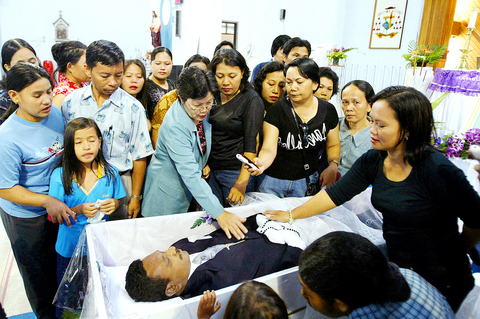Thousands of security personnel guarded churches and markets yesterday after the execution of three Roman Catholic militants sparked sectarian violence in the world's most populous Muslim country, with mobs torching cars and looting stores.
Soldiers and policemen were scouring the jungles for nearly 180 inmates who escaped after Christian youths attacked a prison on Friday in the West Timor town of Atambua, sending guards fleeing into the jungle, local police chief Lieutenant Colonel Heb Behen said.
So far, only 25 inmates have been caught or have surrendered, Behen said.

PHOTO: AP
The executions of the Christian militants by firing squad for a brutal massacre at an Islamic school six years ago appeared to smooth the way for the executions of three Muslims convicted in the 2002 Bali bombings.
Some analysts said the government would be unwilling to spark public anger by carrying out death sentences against the Islamic convicts ahead of the Christians.
Vice President Jusuf Kalla appealed for calm following Friday's violence, which left at least five people injured.
He said the executions had nothing to do with religion.
Fabianus Tibo, 60, Marinus Riwu, 48, and Dominggus da Silva, 42, were convicted of leading a Christian militia that launched a series of attacks in May 2000 -- including a machete and gun assault on an Islamic school where scores of men were seeking shelter.
Muslim groups put the death toll at 191.
The attack on the school was one of the most brutal incidents during sectarian violence that swept central Sulawesi province from 1998 to 2002. At least 1,000 people from both faiths were killed.
However, only a handful of Muslims were ever punished for their part in the unrest, and none to more than 15 years behind bars.
Although violence in Sulawesi, which has a significant Christian presence, largely ended with the signing of a peace deal in 2002, there have since been isolated attacks, from bombings to beheadings. The town of Palu, the provincial capital and the scene of Friday's pre-dawn executions, was quiet yesterday with hundreds of policemen patrolling the main roads.
But tensions remained over a government decision to hastily bury one of the condemned men, da Silva. Family and friends dug up his body, saying they wanted to rebury him in their own coffin and in his own clothes.
The bodies of Tibo and Riwu were returned to their hometowns in Beteleme, where families and friends planned to bury them today.
On Friday, Christian mobs rampaged in the Sulawesi villages of Tentena and Lage, torching cars and police posts after learning of the executions.
On the island of Flores, the condemned men's birthplace in East Nusatenggara province, machete-wielding youths terrorized residents and tore apart the local parliament, breaking windows and smashing doors and overturning benches.

‘TERRORIST ATTACK’: The convoy of Brigadier General Hamdi Shukri resulted in the ‘martyrdom of five of our armed forces,’ the Presidential Leadership Council said A blast targeting the convoy of a Saudi Arabian-backed armed group killed five in Yemen’s southern city of Aden and injured the commander of the government-allied unit, officials said on Wednesday. “The treacherous terrorist attack targeting the convoy of Brigadier General Hamdi Shukri, commander of the Second Giants Brigade, resulted in the martyrdom of five of our armed forces heroes and the injury of three others,” Yemen’s Saudi Arabia-backed Presidential Leadership Council said in a statement published by Yemeni news agency Saba. A security source told reporters that a car bomb on the side of the road in the Ja’awla area in

PRECARIOUS RELATIONS: Commentators in Saudi Arabia accuse the UAE of growing too bold, backing forces at odds with Saudi interests in various conflicts A Saudi Arabian media campaign targeting the United Arab Emirates (UAE) has deepened the Gulf’s worst row in years, stoking fears of a damaging fall-out in the financial heart of the Middle East. Fiery accusations of rights abuses and betrayal have circulated for weeks in state-run and social media after a brief conflict in Yemen, where Saudi airstrikes quelled an offensive by UAE-backed separatists. The United Arab Emirates is “investing in chaos and supporting secessionists” from Libya to Yemen and the Horn of Africa, Saudi Arabia’s al-Ekhbariya TV charged in a report this week. Such invective has been unheard of

US President Donald Trump on Saturday warned Canada that if it concludes a trade deal with China, he would impose a 100 percent tariff on all goods coming over the border. Relations between the US and its northern neighbor have been rocky since Trump returned to the White House a year ago, with spats over trade and Canadian Prime Minister Mark Carney decrying a “rupture” in the US-led global order. During a visit to Beijing earlier this month, Carney hailed a “new strategic partnership” with China that resulted in a “preliminary, but landmark trade agreement” to reduce tariffs — but

SCAM CLAMPDOWN: About 130 South Korean scam suspects have been sent home since October last year, and 60 more are still waiting for repatriation Dozens of South Koreans allegedly involved in online scams in Cambodia were yesterday returned to South Korea to face investigations in what was the largest group repatriation of Korean criminal suspects from abroad. The 73 South Korean suspects allegedly scammed fellow Koreans out of 48.6 billion won (US$33 million), South Korea said. Upon arrival in South Korea’s Incheon International Airport aboard a chartered plane, the suspects — 65 men and eight women — were sent to police stations. Local TV footage showed the suspects, in handcuffs and wearing masks, being escorted by police officers and boarding buses. They were among about 260 South